The Reading Brain, Kindness, and Contemplation
 Remember Proust and the Squid, cognitive neuroscientist Maryanne Wolf's 2007 account of how humans learned to engage in that seemingly unnatural activity we call reading? How the brain was changed by that unprecedented development and is now on the brink of changing yet again?Here is the follow-up to that book. It's epistolary in form, consisting of a series of letters to readers.It's titled Reader, Come Home.Speaking for myself, I can't resist a good invitation. I am now reading a letter a day from Maryanne Wolf to--me!
Remember Proust and the Squid, cognitive neuroscientist Maryanne Wolf's 2007 account of how humans learned to engage in that seemingly unnatural activity we call reading? How the brain was changed by that unprecedented development and is now on the brink of changing yet again?Here is the follow-up to that book. It's epistolary in form, consisting of a series of letters to readers.It's titled Reader, Come Home.Speaking for myself, I can't resist a good invitation. I am now reading a letter a day from Maryanne Wolf to--me! Or at least that's how it feels. This line, for example:
Or at least that's how it feels. This line, for example:
To be sure, when I was a child learning to read, I did not think about reading. Like Alice, I simply jumped down reading's hole into Wonderland and disappeared for most of my childhood.
That was the child me. I have ended up living a life of words, a life built around reading but I sometimes wonder if I have lost the ability to leap into a book and lose myself, the way I did as a child, when the boundaries of the real world just dissolved and I was impervious to all distraction.Proust and the Squid fascinated me and left me with questions about the young readers I write for and whether reading would be changed by emerging media. Now, more than a decade later, those questions have coalesced into worry, as we find ourselves deeply entrenched in a culture of digital media with all its bells and whistles, quickness and instant bling.I'm delving right now into the last round of edits on a middle grade nonfiction project that is definitely all about the long haul, about thinking deeply and embracing kindness. That potential reader, 8 or 10 or 12 years old, is never far from my thoughts. For many reasons, this book seems particularly timely.There's something about the format of the letter that is at once anachronistic and entirely appropriate to the subject. A letter invites me to pause, to think about a point, to feel in communication with the writer. Wolf cites Rainer Maria Rilke's kindness in Letters to a Young Poet as a source of inspiration. She writes about Aristotle's good society with its three lives--knowledge and productivity; entertainment and leisure; and contemplation--and suggests there are three kinds of reading lives as well. She wonders if that third life of contemplation is in danger from the sequestered kind of reading that everyone does nowadays, reading only what we agree with, reading only in easily consumable bites.The reading brain, she says, is the "canary in our minds. We would be the worst of fools to ignore what it has to teach us."Rilke writes in the first of his letters:
Therefore, my dear friend, I know of no other advice than this: Go within and scale the depths of your being from which your very life springs forth.
Wolf warns us against losing that very ability to "go within." It's a skill we've spent millennia acquiring. It seems a shame to toss it away now.